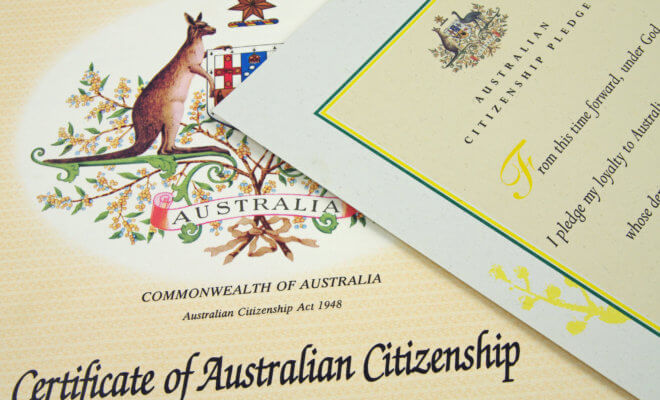Crime
Indian Man Refused Australian Citizenship for Not Disclosing Earlier Conviction Over Stolen Shoes

Australian citizenship certificate and oath pledge.
Photo:; Bigstock
The Administrative Appeals Tribunal in Australia rejected the Indian man's citizenship plea for not disclosing his court conviction over a pair of stolen shoes and credit card in 2010.
An Indian national has been denied Australian citizenship for hiding information about his past court convictions in his applications for permanent residency and citizenship.
Identifying the man only with his last name, SBS reported that Patel, 35, did not disclose in his citizenship application that he was convicted for stealing a pair of shoes and possessing a credit card that was also apparently stolen.
The Administrative Appeals Tribunal (AAT) found that Patel had knowingly hidden the court conviction when he had applied for permanent residency application in March 2010 and in his application for citizenship in July 2016.
Although he was issued a permanent visa in 2015, the Immigration Department later got to know that he was convicted by a Sydney court in February 2010 on charges of “larceny and goods in personal custody suspected being stolen,” the report said, adding that it was for this reason that his citizenship application was rejected.
According to police records that were produced in the AAT, Patel, who was an international student in Australia in January 2010, stole a pair of shoes from a shopping center and was caught near the exit. Along with the shoes, the police also found a credit card on him that they suspected was stolen, the report added.
Patel pleaded guilty to both the charges and said that the credit card belonged to his friend who had given it to him for safe keeping.
When he came before the AAT, he said that was “sorry and embarrassed” for not disclosing his conviction in his citizenship application as the incident had happened years ago and it didn’t really occur to him to mention it in the forms. He also said that he didn’t realize that he wouldn’t get another shot at fixing any mistakes in his application later.
“My situation was one of not paying sufficient concentrated attention to what I was doing and not attending to the exact wording of everything I had to read,” he told the tribunal.
The AAT rejected his argument of forgetting to mention his conviction by saying that he had revealed it while registering his business two months before applying for Australian citizenship, and discussing it with his business partner. The AAT called his behavior “plainly dishonest.”
After finding differences in what he told the court with the police records, the AAT said last month that non-disclosure of convictions on his part was a deliberate “pattern of dishonesty.”
“The Tribunal finds that [Mr. Patel] changes his storyline often. This is particularly in relation to the circumstances which led to his convictions,” AAT member C. Edwardes said in the judgement, before rejecting his citizenship application.




You must be logged in to post a comment Login